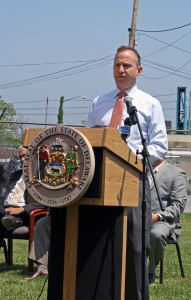Air Quality Improvements Unveiled At Trinity Port Services In New Castle
Department of Natural Resources and Environmental Control | Former Governor Jack Markell (2009-2017) | Office of the Governor | Date Posted: Friday, May 4, 2012
Department of Natural Resources and Environmental Control | Former Governor Jack Markell (2009-2017) | Office of the Governor | Date Posted: Friday, May 4, 2012
Electrified outlets will improve quality of life for neighbors
 NEW CASTLE – A cooperative project that improves Delaware air quality and the quality of life for neighborhood residents was unveiled today at a ceremony at Trinity Port Services in New Castle. Twenty electrified outlets that power refrigerated storage containers at the company’s Rogers Road site have replaced the use of diesel generators, significantly reducing air pollutants, diesel fumes and noise in the community.
NEW CASTLE – A cooperative project that improves Delaware air quality and the quality of life for neighborhood residents was unveiled today at a ceremony at Trinity Port Services in New Castle. Twenty electrified outlets that power refrigerated storage containers at the company’s Rogers Road site have replaced the use of diesel generators, significantly reducing air pollutants, diesel fumes and noise in the community.
Governor Jack Markell and Trinity Port Services Company President Darrel Banning were joined by DNREC Secretary Collin O’Mara, Regional EPA Administrator Shawn M. Garvin, Clean Air Council Coordinator Abby Poses, DuPont Edge Moor Plant Manager Elizabeth Schowe, Rose Hill Community Center Director Shelia Berkel, Senator David McBride (D-Hawks Nest), Senator Margaret Rose Henry (D-Wilmington East), Representative James J. Johnson (D-Jefferson Farms), and New Castle County Councilman Jae P. Street (10th District) to announce the cleaner alternative to diesel generators.
“This project is an excellent example of government, private business, environmental advocacy organizations and the community working together to find a safe, effective way of improving air quality and reducing health risks,” said Governor Markell. “We are always looking for ways to make our air cleaner and together, we are making progress.”
The project addresses the problems of air pollution, odors and noise that have affected residents who live near the facility. Neighbors and community leaders from local civic associations were instrumental in bringing the problems to the attention of environmental advocacy organizations and the state government. After Trinity Port Services acquired the business in 2007, company management immediately recognized the needs of the neighborhood, moved equipment and installed barriers to reduce noise and diesel fumes in the area. Additionally, the company has implemented environmentally-friendly improvements at the site.
 In 2011, DNREC proposed the project at Trinity Port Services after DuPont applied for a Coastal Zone Act permit to install two large boilers at its Edge Moor facility in Wilmington. Delaware’s Coastal Zone Act regulates heavy industrial activities, as well as new and existing manufacturing activities in the state’s Coastal Zone. Coastal Zone regulations require companies to offset air emissions and other negative environmental impacts.
In 2011, DNREC proposed the project at Trinity Port Services after DuPont applied for a Coastal Zone Act permit to install two large boilers at its Edge Moor facility in Wilmington. Delaware’s Coastal Zone Act regulates heavy industrial activities, as well as new and existing manufacturing activities in the state’s Coastal Zone. Coastal Zone regulations require companies to offset air emissions and other negative environmental impacts.
Under an agreement between DuPont and DNREC, DuPont, as a condition of its Coastal Zone permit, funded this project to offset air emissions from the boilers at the Edge Moor facility. In addition, DuPont provided funding for technical and administrative oversight of the project to the Clean Air Council through its diesel pollution reduction program.
According to DNREC Secretary Collin O’Mara, the project eliminates up to 120 tons of harmful air pollutants annually from the Trinity site. “This Coastal Zone environmental offset project is an innovative solution to the longstanding air quality, odor and noise problems in the neighborhood,” he said. “The project ensures clean air by supporting the state’s ongoing efforts to reduce diesel emissions.”
“This clean air project at Trinity Port Services underscores the value of partnering between government and the private sector, and proves that common-sense changes can deliver exceptional results,” said EPA mid-Atlantic Regional Administrator Shawn M. Garvin. “By working with DNREC and partnering with DuPont on this project, Trinity Port Services is helping protect the health and livability of nearby community residents.”
“The new outlets installed at Trinity will eliminate the use of up to 600 gallons of diesel per week,” said Abby Poses, Clean Transportation Coordinator with the Clean Air Council. “The installation of these outlets will go a long way towards improving air quality and minimizing the effects of diesel on public health. The Clean Air Council has been honored to be a part of such an important project with DNREC, DuPont and Trinity Port Services.”
“Providing the funds for this project helped DuPont, the community and the environment in another way,” said DuPont Edge Moor Plant Manager Elizabeth Schowe. “In addition to improving the quality of life for our neighbors, we were enabled to install two clean-burning, energy efficient, gas-fired generators at our plant. That reduced our dependence on a less efficient and less clean coal-burning power producer.”
 “Those of us who live next to this facility truly appreciate everyone’s efforts on this important project,” said Sheila Berkel, Director of the Rose Hill Community Center. “So often our community seems to get overlooked on issues that negatively impact one’s quality of life. We’re excited about what’s being done here today, and we certainly hope our leaders and elected officials will continue to focus their attention on the needs of the people who live near industrial plants like this one.”
“Those of us who live next to this facility truly appreciate everyone’s efforts on this important project,” said Sheila Berkel, Director of the Rose Hill Community Center. “So often our community seems to get overlooked on issues that negatively impact one’s quality of life. We’re excited about what’s being done here today, and we certainly hope our leaders and elected officials will continue to focus their attention on the needs of the people who live near industrial plants like this one.”
“This project demonstrates Trinity’s commitment to our community as well as our environment,” said Trinity Port Services Company President Darrel Banning. “We appreciate the teamwork and collaboration with all of the involved parties for the common goal of cleaner air. We are very thankful for the funding, as this is only the first step in the future development of greener initiatives for Trinity Port Services.”
Keep up to date by receiving a daily digest email, around noon, of current news release posts from state agencies on news.delaware.gov.
Here you can subscribe to future news updates.
Department of Natural Resources and Environmental Control | Former Governor Jack Markell (2009-2017) | Office of the Governor | Date Posted: Friday, May 4, 2012
Electrified outlets will improve quality of life for neighbors
 NEW CASTLE – A cooperative project that improves Delaware air quality and the quality of life for neighborhood residents was unveiled today at a ceremony at Trinity Port Services in New Castle. Twenty electrified outlets that power refrigerated storage containers at the company’s Rogers Road site have replaced the use of diesel generators, significantly reducing air pollutants, diesel fumes and noise in the community.
NEW CASTLE – A cooperative project that improves Delaware air quality and the quality of life for neighborhood residents was unveiled today at a ceremony at Trinity Port Services in New Castle. Twenty electrified outlets that power refrigerated storage containers at the company’s Rogers Road site have replaced the use of diesel generators, significantly reducing air pollutants, diesel fumes and noise in the community.
Governor Jack Markell and Trinity Port Services Company President Darrel Banning were joined by DNREC Secretary Collin O’Mara, Regional EPA Administrator Shawn M. Garvin, Clean Air Council Coordinator Abby Poses, DuPont Edge Moor Plant Manager Elizabeth Schowe, Rose Hill Community Center Director Shelia Berkel, Senator David McBride (D-Hawks Nest), Senator Margaret Rose Henry (D-Wilmington East), Representative James J. Johnson (D-Jefferson Farms), and New Castle County Councilman Jae P. Street (10th District) to announce the cleaner alternative to diesel generators.
“This project is an excellent example of government, private business, environmental advocacy organizations and the community working together to find a safe, effective way of improving air quality and reducing health risks,” said Governor Markell. “We are always looking for ways to make our air cleaner and together, we are making progress.”
The project addresses the problems of air pollution, odors and noise that have affected residents who live near the facility. Neighbors and community leaders from local civic associations were instrumental in bringing the problems to the attention of environmental advocacy organizations and the state government. After Trinity Port Services acquired the business in 2007, company management immediately recognized the needs of the neighborhood, moved equipment and installed barriers to reduce noise and diesel fumes in the area. Additionally, the company has implemented environmentally-friendly improvements at the site.
 In 2011, DNREC proposed the project at Trinity Port Services after DuPont applied for a Coastal Zone Act permit to install two large boilers at its Edge Moor facility in Wilmington. Delaware’s Coastal Zone Act regulates heavy industrial activities, as well as new and existing manufacturing activities in the state’s Coastal Zone. Coastal Zone regulations require companies to offset air emissions and other negative environmental impacts.
In 2011, DNREC proposed the project at Trinity Port Services after DuPont applied for a Coastal Zone Act permit to install two large boilers at its Edge Moor facility in Wilmington. Delaware’s Coastal Zone Act regulates heavy industrial activities, as well as new and existing manufacturing activities in the state’s Coastal Zone. Coastal Zone regulations require companies to offset air emissions and other negative environmental impacts.
Under an agreement between DuPont and DNREC, DuPont, as a condition of its Coastal Zone permit, funded this project to offset air emissions from the boilers at the Edge Moor facility. In addition, DuPont provided funding for technical and administrative oversight of the project to the Clean Air Council through its diesel pollution reduction program.
According to DNREC Secretary Collin O’Mara, the project eliminates up to 120 tons of harmful air pollutants annually from the Trinity site. “This Coastal Zone environmental offset project is an innovative solution to the longstanding air quality, odor and noise problems in the neighborhood,” he said. “The project ensures clean air by supporting the state’s ongoing efforts to reduce diesel emissions.”
“This clean air project at Trinity Port Services underscores the value of partnering between government and the private sector, and proves that common-sense changes can deliver exceptional results,” said EPA mid-Atlantic Regional Administrator Shawn M. Garvin. “By working with DNREC and partnering with DuPont on this project, Trinity Port Services is helping protect the health and livability of nearby community residents.”
“The new outlets installed at Trinity will eliminate the use of up to 600 gallons of diesel per week,” said Abby Poses, Clean Transportation Coordinator with the Clean Air Council. “The installation of these outlets will go a long way towards improving air quality and minimizing the effects of diesel on public health. The Clean Air Council has been honored to be a part of such an important project with DNREC, DuPont and Trinity Port Services.”
“Providing the funds for this project helped DuPont, the community and the environment in another way,” said DuPont Edge Moor Plant Manager Elizabeth Schowe. “In addition to improving the quality of life for our neighbors, we were enabled to install two clean-burning, energy efficient, gas-fired generators at our plant. That reduced our dependence on a less efficient and less clean coal-burning power producer.”
 “Those of us who live next to this facility truly appreciate everyone’s efforts on this important project,” said Sheila Berkel, Director of the Rose Hill Community Center. “So often our community seems to get overlooked on issues that negatively impact one’s quality of life. We’re excited about what’s being done here today, and we certainly hope our leaders and elected officials will continue to focus their attention on the needs of the people who live near industrial plants like this one.”
“Those of us who live next to this facility truly appreciate everyone’s efforts on this important project,” said Sheila Berkel, Director of the Rose Hill Community Center. “So often our community seems to get overlooked on issues that negatively impact one’s quality of life. We’re excited about what’s being done here today, and we certainly hope our leaders and elected officials will continue to focus their attention on the needs of the people who live near industrial plants like this one.”
“This project demonstrates Trinity’s commitment to our community as well as our environment,” said Trinity Port Services Company President Darrel Banning. “We appreciate the teamwork and collaboration with all of the involved parties for the common goal of cleaner air. We are very thankful for the funding, as this is only the first step in the future development of greener initiatives for Trinity Port Services.”
Keep up to date by receiving a daily digest email, around noon, of current news release posts from state agencies on news.delaware.gov.
Here you can subscribe to future news updates.